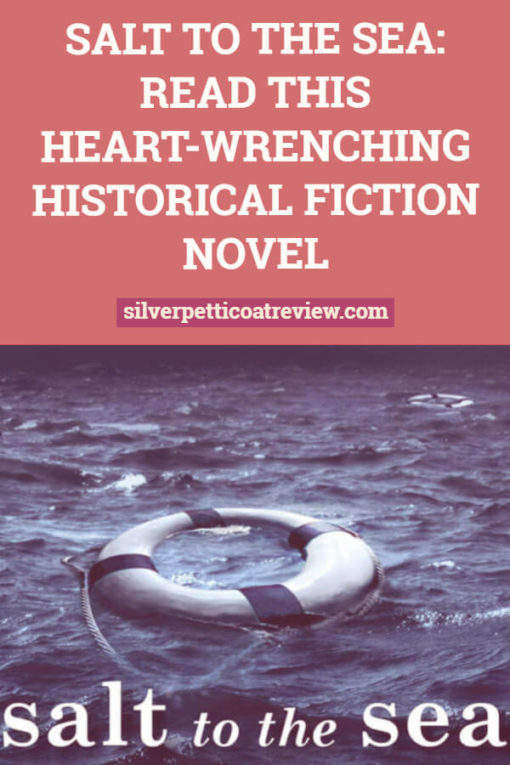Salt to the Sea (2016) by Ruta Sepetys

In 1945, World War II is drawing to a close in East Prussia and thousands of refugees are on a desperate trek toward freedom, almost all of them with something to hide. Among them are Joana, Emilia, and Florian, whose paths converge en route to the ship that promises salvation, the Wilhelm Gustloff. Forced by circumstance to unite, the three find their strength, courage, and trust in each other tested with each step closer toward safety. Just when it seems freedom is within their grasp, tragedy strikes. Not country, nor culture, nor status matter as all ten thousand people aboard must fight for the same thing: survival.
Salt to the Sea Book Review
Ruta Sepetys’ award-winning Salt to the Sea is historical fiction with a capital H. Based upon true events, on a horrific disaster in the Baltic Sea, and the events leading up to it, Salt to the Sea sets human faces and fates and stories to a little-known wartime tragedy. Sepetys has drawn upon actual accounts of the tragic sinking of the Wilhelm Gustloff, interviewing many survivors and their relatives.
The Wilhelm Gustloff carried upwards of 10,000 refugees when it was torpedoed by Soviet submarines the 30th of January 1945. Over 9,000 perished. It’s the largest loss of life in a single ship sinking in maritime history, far surpassing the losses of the Titanic and the Lusitania.
RELATED: TITANIC (1997) – A 20TH ANNIVERSARY REVIEW
And to that date with fate, our protagonists walk. Get the tissues ready, this is a weepy read.
Four Narrators, One Common Thread
Joana, Emilia, Florian, and Alfred – these are the four voices of Salt to the Sea. The narrative hops between these four differing perspectives every few pages. This makes for quite a gripping page-turner. It flows fantastically well.
Joana is a young Lithuanian nurse separated from her family.
Emilia is a young, Polish woman, fifteen years old, separated from her family. She knows they’re dead.
Florian is a young Prussian man, artist, and art restorer, separated from his family. He’s on a secret mission of his own.
Meanwhile, Alfred is a young, German soldier, posted far from his family. He cites the Führer and composes mental letters to his love back home.
RELATED: LAST TRAIN TO ISTANBUL: A WONDERFUL TURKISH NOVEL
Joana, Emilia, and Florian all end up on the same refugee road, hiding from Soviet and German soldiers alike. The Soviets because they kill and rape and pillage without a second thought. And the Germans because none of them have papers to travel – the Reich has not given permission to flee from the advancing Soviet troops. Their destination is to get to a port, where ships wait to take refugees to safety.
Circumstances thrust these three together, along with some other lonely, lost souls: the wandering boy, the shoe poet, the blind girl, and the giantess. In the intensity of their journey, guards are eroded, trust is earned, secrets are revealed, and they come to love one another deeply, this little rag-tag band of refugees.
And can I just say that a gentle romance builds between Joana and Florian in an understated and lovely way? Sigh. Sniff.
Heart-Wrenching and Heart-Warming Historical Fiction
Salt to the Sea is a lovely, lovely, bittersweet read. It’s also a surprisingly quick read, the pages just fly by, as you find yourself wrapped up in the fates of these young people.
The book puts you in the shoes of refugees, people just trying to live, to find a safe harbor. It shows desperate circumstances and desperate decisions. Fate is cruel and fickle. War is brutal, the brunt of its brutality hitting the young, denying them a future.
Yes, it’s all there in Salt to the Sea. And yet, there is also much beauty and tenderness and goodness and compassion and love, self-sacrificing love. Oh man, the tears are welling in my eyes again. Read this book.
There is a powerful message within its pages about humanity and our potential for greatness – great and terrible things and great and good things. And about choosing how we will be.
Sniff. Tearing up again…
Content Note: The whole subject matter of Salt to the Sea is sobering and violent. It’s in the middle of a war. People do die. But there is nothing explicit in terms of violent descriptions, profanity, etc.
Adaptation Recommendation: Yes, please. Universal Pictures has optioned the book, so a film is hopefully in the works.





This fits in with the novel I’ve been working on/researching. I’m going to check it out. 🙂
Do! It was such a good surprise to me. I had picked it up just because, not knowing much about the book or the author and was so blown away by it. I really enjoyed it. And it sounds like quite the interesting novel you’re working on!
Thanks! 🙂